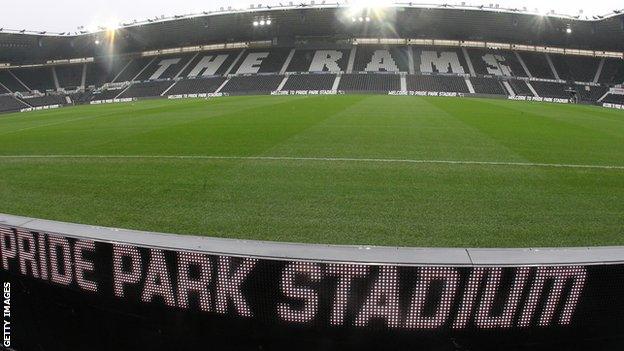Derby County: Championship club charged for breach of spending rules
- Published

Derby sold Pride Park to owner Mel Morris and then leased the stadium back
Derby County have been charged by the English Football League for a breach of spending rules and now face a possible points deduction.
The charge relates to losses in the three years up to June 2018, despite the club posting a pre-tax profit of £14.6m in 2017-18 after Pride Park was sold to owner Mel Morris for £80m.
Spending rules allow Championship clubs to lose £39m over a three-year period.
Derby have now been referred to an Independent Disciplinary Commission.
It will hear from both the Rams and the EFL, although a date has not been announced.
Derby believe they kept the EFL in the loop with all issues regarding their stadium sale, which the EFL signed off, so are unsure what the issue is.
In March 2019, Birmingham City were deducted nine points by the EFL for a similar charge of breaching profitability and sustainability rules.
The Rams are 17th in the Championship and 10 points above the relegation zone.
Between 1 July, 2017 and 30 June, 2018, Derby recorded a pre-tax profit for the first time in 10 years and in the three years under review by the EFL, the club saw combined pre-tax losses of just over £8m.
While that appears well below the £39m of allowable losses set out in league rules, the sale of their Pride Park home has come under scrutiny.
The Rams have leased back the ground, which was said to have been independently valued at £80m despite it being on the club's books as an asset worth £41m, from a company owned by Morris.
Just months after the stadium arrangement was announced in April, the club signed England all-time record goal scorer Wayne Rooney on a player-coach deal.
The deal for the former Manchester United and Everton forward came after the club made Poland midfielder Krystian Bielik their record signing, bringing him in on a five-year deal from Arsenal in August.
By selling the ground to Morris, the Rams set a trend which has been followed by Sheffield Wednesday, Aston Villa, Reading and Birmingham City.
Wednesday were charged with misconduct in December for the sale of Hillsborough, which helped them record a profit of £2.5m in 2017-18.
Analysis
BBC Sports news reporter Laura Scott
The fact it has taken since the summer of 2018 - when Derby made the relevant profit and sustainability submissions - for the EFL to bring these charges shows this case is far from straightforward.
It was telling that Derby acknowledged in their latest accounts that sticking to these rules was a "significant challenge" but they issued a statement last year that indicated they were confident they were within the £39m loss limit.
This will be a huge blow for the club, which has faced criticism over its lucrative deal with bookmaker 32Red to bring Wayne Rooney to the club and then paid players late earlier this month.
Not only could this case result in points deductions but it may harm Mel Morris' ability to secure fresh investment.
This is the latest example of financial turmoil in the EFL, and is the third case of a club being charged with breaking profit and sustainability rules, which were introduced in 2016.
Sheffield Wednesday are still awaiting their disciplinary panel for alleged breaches.